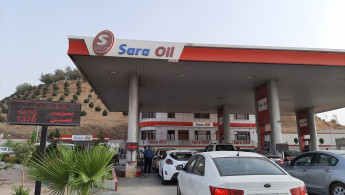Iraqi Kurdistan: fuel prices skyrocketing amid lack of subsidies, regulations
Prices of different types of benzene and gasoline are significantly increasing on a daily basis in the Iraqi Kurdistan region as the Kurdish authorities are not subsidising prices and the federal government in Baghdad no longer provides subsidised fuel to the region.
Fuel prices in the region have risen by more than 50 per cent per litre. In January the price of the lowest quality benzine, locally called ‘Normal', was 800 Iraqi dinars per litre, but now the price has reached 1300 dinars. Prices are expected to continue to increase in the coming days.
The Iraqi federal government sells subsidised fuel marked at 450 dinars only in areas under its control, but the Kurdistan Regional Government (KRG), which exports more than 500 barrels of oil per day to the international markets and owns two major oil refineries, is not spending a single cent on fuel to support local citizens.
In the recent past, the Iraqi government used to transport one million litres per day of subsidised fuel to the four provinces of the Kurdistan region, where it was sold at 690 dinars, but this process was recently halted.
The subsidised fuel from the Iraqi federal government to KRG was delivered to the Kawergosk oil refinery, one of the largest refineries in the Kurdistan region that lies in the Khabat district west of Erbil. The refinery is run by Kar Group, a Kurdish oil company.
In April several Katyusha rockets landed near the refinery.
"The Iraqi government is currently not sending any fuel to the Kurdistan region," Soran Omar, a member of the Iraqi parliament from the Kurdistan Justice Group, told The New Arab in a phone interview. "It is being said that the April rocket attack allegedly caused damages to the Kawergosk oil refinery and now it does not operate."
He said another reason behind the halt by the Iraqi government is that "those receiving and delivering the one million litres subsided fuel were stealing part of it and selling it based on commercial prices."
"They were mixing condensate and other cancerous substances with the fuel in order to make the highest advantage. Consequently, 15 new cases of cancer per day are recorded in Sulaimaniyah city," Omar added.
The KRG previously said that the rise in fuel prices is mainly related to the increasing prices in the international stock markets, but Omar disputes this point, saying that fuel is not imported from outside Iraq.
"The KRG should regulate the fuel market since it neither supports fuel prices nor gives raw oil to the refineries to produce fuel. The KRG has left the fuel sector to the free market that is controlled by a group of mafia and greedy people who increase the prices," he added.
"I struggle to earn the daily bread of my own family as well as my sisters and brothers with this taxi. I pay 20,000 dinars per day for gasoline, but I cannot earn 30,000 dinars at the end of the day," Hawsar Rahim Rashid, a 26-year-old taxi driver from Sulaymaniyah, told TNA while waiting in line at a petrol station.
"In Kirkuk, you buy a litre of our own fuel for just 450 dinars, but here we pay 1,300 dinars for it. The reason behind all this chaos is the lack of a competent government in the Kurdistan region," Rashid said.
For his part, Karwan Omar Ali, a grocer selling fruits and vegetables through his Kia truck, also complained about the rise of fuel prices to the TNA.
"The fuel prices have more than doubled and affected the lives of everyone here. Previously I paid 10,000 dinars for gasoline, now I pay 20,000 dinars, and above all people are not buying daily needs because everything has become expensive," Ali said.





 Follow the Middle East's top stories in English at The New Arab on Google News
Follow the Middle East's top stories in English at The New Arab on Google News


